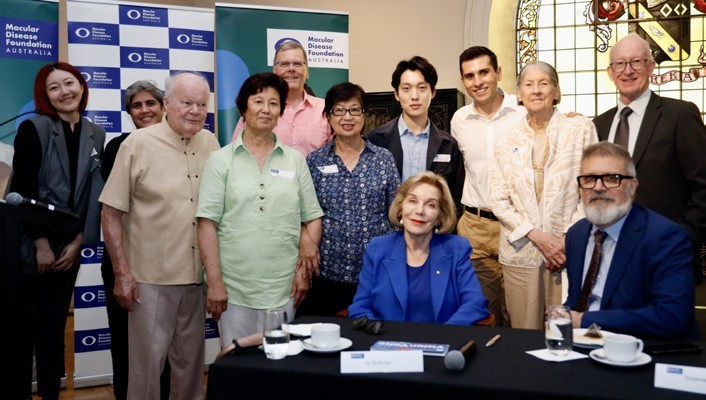Macular Disease Social Impact Survey Highlights Cost, Access
A survey of almost 2,000 Australians living with macular disease has found one in 10 struggles to afford the cost of sight-saving treatment, while a similar number cannot afford visual aids.
Macular Disease Foundation Australia (MDFA) CEO Dr Kathy Chapman said the second Macular Disease Social Impact Survey also showed:
• Nine in 10 people visit an eye health professional at least once per year,
• One in 10 people are struggling with a diagnosed mental health issue,
• Six in 10 people with poor vision use low vision aids and technologies, but one in 10 people said they can’t afford the cost,
• Falls were significantly more common in people with worse self-rated vision.
Dr Chapman was speaking at the annual general meeting for MDFA, held late last year. She told the audience that the survey also revealed that about two-thirds of survey respondents had used one or more of MDFA’s services, with on average about 70% rating the services as good or excellent.
The Macular Disease Social Impact Survey is conducted in partnership with the University of New South Wales School of Optometry and Visual Science. Each survey contains some repeated questions about demographics, macular health, vision, general health, and MDFA services, as well as asking new questions that are unique to each survey.
PROGRESS AGAINST NATIONAL ACTION PLAN
Dr Chapman said there had been some “significant areas of progress over the last four years” since the development of a National Action Plan for macular disease in 2019. But she said action was still needed to:
• Improve access to public hospital services for people with macular disease,
• Improve affordability of intravitreal injections and improve persistence with treatment,
• Provide accessible low vision aids and technology,
• Bridge the gaps between the health, aged care, and disability sectors.
• Boost research funding to eye health.
MY EYES
Dr Chapman also previewed a new support service to be offered by MDFA, which will be officially launched in May as part of Macula Month.
“My Eyes is a new way of supporting people living with macular disease. The service has been developed in collaboration with people with macular disease, carers, and eye healthcare professionals to ensure those living with the disease get the best care between visits to their optometrist or ophthalmologist.”
She said it was the first independent, personalised support service for all people living with age-related macular degeneration (AMD). It will focus on providing health information, practical advice, and emotional support.
CELEBRATION OF SUPPORTERS
The event was billed as a “Celebration of Supporters”, paying tribute to volunteers.
MDFA Patron Ita Buttrose AC OBE, who has volunteered for the organisation for the past 17 years, said the number of volunteers supporting MDFA had increased threefold.
“We now have volunteers represented in New South Wales, Australian Capital Territory, Victoria, Queensland, South Australia, and Western Australia,” Ms Buttrose said.
“The roles have also diversified to reflect new programs and unmet needs for the community. These roles include data analysis, project management, writing, design, psychology, legislation and policy, and foreign language.”
Ms Buttrose said with 36 active volunteers, volunteers now outnumber staff.
MDFA Chair Graeme Head acknowledged the retirement of Board and Research Committee member Imelda Lynch, and Ashley Chapman from the Finance, Audit, and Risk Committee. Also honoured, was long-standing volunteer Jim Pringle. Mr Pringle, who has low vision because of AMD, has retired after 15 years of active volunteering.
Mr Pringle provided office support, as well as using his lived experience with AMD to help others in the MDFA’s Peer Support Program.
“Jim’s lived experience has also informed our programs, and he has lent his voice to many campaigns to raise awareness about what it is like to live with dry AMD,” Ms Buttrose said.
REVEALING RESEARCH
The AGM also heard a presentation from Professor Justine Smith AM, who is an MDFA Research Grant recipient and the Matthew Finders Distinguished Professor at the College of Medicine and Public Health, at Flinders University.
She spoke on exciting research to develop a cytokine blocker-based treatment for macular oedema. Professor Smith expects to publish the results of her research later in 2024.

MDFA volunteers and staff with MDFA Patron Ita Buttrose and Chair Graeme Head (seated).